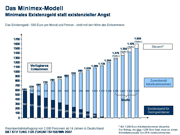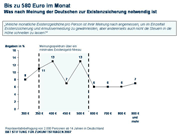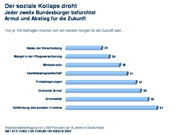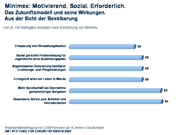580 euros for all.
Basic income instead of fear for the future: What the population demands from politicians
Germans feel that politics lacks sustainability in the financing of social security systems. 86 percent of German citizens currently have significant doubts that "pensions will be secure in the future." 85 percent of the population therefore expects a welfare state to ensure a good standard of living even in times of illness, unemployment, and old age, without suffering hardship. However, according to the population, "medium- and long-term solutions" (87%) are still lacking, solutions that extend far beyond legislative periods and guarantee an adequate level of provision for future generations. The state should therefore provide all citizens with the necessities of life to safeguard against individual life risks and prevent poverty in old age. The introduction of a minimum subsistence allowance ("Minimex") for everyone is recommended as a long-term model, one that guarantees principles of the rule of law such as welfare, basic services, and social justice. Otherwise, almost two-thirds of the population (61%) assume that "social peace is at risk" in the near future. This is the result of a comprehensive futures study in which the BAT FOUNDATION FOR FUTURE ISSUES surveyed a representative sample of 2,000 people aged 14 and over nationwide about the future of social security in Germany.
The alternative to the looming collapse of social systems: The Minimex model
The future study was presented to the public today at a press conference in Hamburg by Prof. Dr. Horst W. Opaschowski, the foundation's scientific director. The research study, which includes analyses and forecasts as well as concrete solutions with a long-term perspective extending to 2030, is also being published as a book entitled "Minimex: The Future Model of a Social Society" (Gütersloher Verlagsanstalt, €17.95).
Professor Opaschowski: „Securing one's standard of living is the existential concern of people at the beginning of the 21st century. More and more people have to reckon with a decline in prosperity and falling net incomes. The fear of social decline has now become a majority concern, even among broad segments of the middle class.“ Only for a minority of Germans (40%) is their own employment the primary source of income. The remaining 60 percent receive social assistance and unemployment benefits, draw pensions, or are supported by their own families and relatives. Opaschowski: „A 40-to-60 society, in which four employed people finance six unemployed people, has become a reality in Germany. The existential question, ‚How will we live in the future?’ is more pressing than ever. And we must start thinking about the minimum standard of living and human dignity early on, before the baby boomers become pensioners en masse.“
When the baby boomer generation retires around 2030 or reaches retirement age years later, a loss of function or even a collapse of the social security systems becomes a real risk. If policymakers fail to demonstrate the courage to implement long-term solutions, the financing of these systems in an aging society will be jeopardized, and existential anxieties will increasingly permeate people's daily lives. Almost one in three Germans (29%) already fears ending up on welfare in old age. The greatest anxieties about the future (41%) in this regard are expressed by the middle generation of 30- to 49-year-olds, who fear becoming dependent on welfare in old age because their contributions will have long since been spent. This so-called sandwich generation works for others and invests for others – for their children and their parents. They fear they will no longer be able to expect the same level of support from the next generation in their old age. Opaschowski: "Future security is jeopardized if the welfare state is operating on a hand-to-mouth basis."„
The decline in official unemployment figures masks the fact that there are fewer and fewer permanent jobs and the number of temporary workers is growing. Over two million employed people today hold multiple jobs, combining their primary, social security-covered employment with one or more mini-jobs. Furthermore, among full-time employees, there are over one million low-wage earners who also rely on unemployment benefit II payments: they are living below their means.
Practical, affordable, socially responsible. The minimum subsistence allowance.
A clear majority of the population supports a state-guaranteed basic income. Nearly two-thirds of German citizens (61%) associate this with the hope that a minimum subsistence allowance will enable everyone to "live with dignity and prevent personally humiliating checks." Otherwise, the basic security of large segments of the population is jeopardized if the welfare state leaves the question of a right to basic provision unanswered and policymakers fail to make sustainable decisions regarding a fundamental restructuring of the outdated social security systems for unemployment, illness, old age, and long-term care. The financing of social security must be placed on a broad and sustainable footing. According to OECD recommendations, this also includes considering tax-based financing of social security systems to reduce the burden on earned income.
To ensure a future free from fear for all citizens, the public believes that social policy must guarantee a minimum standard of living in the long term, without relieving citizens of their personal responsibility and self-sufficiency – that is, without absolving them of the responsibility to provide for themselves through their own work and achievements. Various socio-political approaches across party lines are currently aimed in this direction: The public believes that the term "basic income" describes the concept more accurately than "basic income," "social income," "basic pension," or "citizen's income." Acceptance of the term "basic income" increases with higher levels of education.
Two-thirds of the population (66%) see the entitlement to a minimum subsistence allowance (Minimex) as realizing principles of social justice, which would particularly spare young people who do not find an apprenticeship after school from poverty and discrimination. This would allow young people to take on temporary jobs without losing face and give structure and meaning to their lives. A future society cannot afford a generation of superfluous people. Opaschowski: "Only at first glance might the Minimex model, favored by the population and granting all citizens a minimum subsistence allowance, appear like a kind of statutory charity. In reality, it is nothing other than a state security promise limited to the bare necessities, enabling all citizens to live in freedom and human dignity through material security guarantees, thus preventing them from falling into destitution and poverty."„
According to the public, it is time to set a new course for the future and to tackle the major reform of the social welfare system no later than after the 2009 federal elections. The arguments are compelling: The long-term "Minimex" model is practical, financially viable, and socially responsible. Significant administrative costs can be saved in the state social budget, as a large portion of the costs for monitoring social benefits (unemployment benefits, social assistance, child benefits, etc.) would be eliminated, according to a majority of the population (59%). Opaschowski: "Behind every 'funding pot' lies a state administration and control body. Paying a uniform basic income would allow for the elimination of numerous civil servant positions."„
580 euros per month. "Minimum subsistence level" from the perspective of the population.
How does the public itself assess the amount and value of a minimum subsistence allowance? The public's responses demonstrate a realistic perspective: Opinions on the appropriate level of a minimum subsistence allowance range from €350 to €580 per month, representing a minimum standard of living between eliminating dependency and the level of social assistance required for a single person. The concept of a "required income" is rejected by the public. German citizens favor a moderate minimum. This makes future social policy decisions easier. They are not making excessive demands and are content with a basic level of support.
This is also noteworthy: Almost one in five German citizens feels unable to answer the question of how high a monthly subsistence allowance should actually be. The issue is too new, the level of knowledge too low, and also the imagination too limited to envision having a lifelong entitlement to a state-guaranteed subsistence allowance.
A monthly payment of €580 per person is also advisable from a socio-political perspective: Average social welfare costs per capita per month in Germany already amount to €580. The average social assistance requirement for a single person is also around €580. The population adheres to the principle of fairness. Two-thirds of the population (65%) believe that "if income from employment exceeds a certain threshold (e.g., three times the basic subsistence allowance), the entitlement to the basic subsistence allowance should cease." Those earning this much should no longer require basic subsistence support. The public's vote is clearly against proponents of an "unconditional basic income," for which there are no conditions and which even top earners would receive—whether they need it or not. According to the vast majority of the population, such an option contradicts the principles of social justice. Opaschowski: "To put the demands of the population in a nutshell: No money for millionaires! Even a welfare state cannot absolve its citizens of responsibility for their own well-being. Those who can provide for themselves do not need the state's care."„
„"A policy of small steps." Minimex as a reform of the century.
In implementing the Minimex model, author Opaschowski bases his approach on two principles: The basic income should be as low as necessary, and supplementary earnings as high as possible. He recommends a cross-party policy of small steps that extends far beyond legislative considerations. Opaschowski states: "To avoid being prematurely dismissed as a radical idea, we must accept the need for gradual implementation on the part of those who are proactive and the need for those who are passive to wait." One in two German citizens (52%) supports the implementation of the Minimex model as a phased approach.
Minimex should be implemented gradually. A long-term, phased plan is conceivable: in 2010 for all newborns; in 2020 for all recipients of child benefits and parental allowance; in 2030 for all recipients of unemployment benefit II. Only after 2030 can the payment of a minimum subsistence allowance – while preserving existing rights and entitlements – be extended to all pension insurance holders. This also renders the objections of experts who reject a system change to a tax-financed basic pension unnecessary, because certain pension entitlements have been acquired through individual contributions. This problem does not arise if flexible transition periods and transitional arrangements are planned from the outset. Depending on political will, the transition phase lasts thirty, forty, or fifty years, which also addresses this concern: if it happens, it will be a once-in-a-century reform.
Otherwise, Germans face a worrying future. When asked, "What happens if nothing is done?", every second German citizen (50%) cites the threat of poverty. The risk of poverty is even considered higher than the potential dangers of terrorism (44%) or problems caused by environmental pollution (47%). And the fear of a growing gap between rich and poor ("two-class society") weighs more heavily (41%) than the declining birth rate (23%) or the education crisis (22%). As a result, almost two-thirds of the population (61%) fear the spread of crime and violence in Germany – "if there is no entitlement to state welfare and social benefits." The basic security of large segments of the population is no longer guaranteed without a social safety net.
„"A gift from birth." A drive for achievement and a zest for life
Securing a basic standard of living does not diminish the desire to work and achieve. Quite the contrary: The vast majority of the population (84%) believes that those who want to afford more than others "must also achieve more." It is only through individual performance comparisons that special experiences of success in life are created. No one has to "fall by the wayside" or be "left behind" if basic needs are met. However, those who want to live better in the future cannot forgo achievement.
The consumption barometer is becoming a performance barometer. Exceptions prove the rule: Even in the performance-oriented society of the future, there will, as before, be some who refuse to perform (16%), but who will also have to make sacrifices in life as a result. Opaschowski: "That has always been the case. A new social system cannot create a new kind of person. As throughout human history, there will continue to be people who want to exert themselves less than others in life." This will amount to about 16 out of every 100 German citizens, who present themselves as more phlegmatic than ambitious. All the others, however, prefer to be maximizers and optimizers in life. Instead of "You have to achieve something," for them it's more like "I want to afford myself."„
And anyone who asks, "Who still wants to work?" has completely overlooked human psychology. Opaschowski: "People are demonstrably happiest when they possess something others don't. For most people, competition and the race for status remain the primary driving force for making themselves better off than others."„
„"What may we hope for?" The future model of a social society
Citizens desire an end to the looming threat of social insecurity and a redefinition of social justice. Surprisingly, social justice tops the list of Germans' wishes for the future – both in West Germany (75%) and in East Germany (74%). On this issue, there are hardly any differences between individual occupational, social, and age groups. The population is calling for urgent political action and for future-proof, demographically sustainable solutions to safeguard social systems.
By 2030, the average life expectancy of Germans will increase by another five years, and the proportion of people requiring care could double. Professor Opaschowski: „This threatens a massive financial redistribution at the expense of the younger generation. It's already clear: things can't continue like this. The consequences of declining living standards and a shrinking workforce, higher life expectancy, and increasing care needs can no longer be financed solely through day-to-day political decisions. Instead of simply revisiting or adjusting unresolved social policy problems in every legislative period and shuffling funds back and forth between social security funds, Germany needs a truly fundamental reform, one that lives up to its name.”.
Major reforms require large majorities, cross-party initiatives, and alliances for intergenerational justice to prevent financial redistribution from further burdening future generations. Experience shows that top-down reforms implemented too late and then too hastily face massive public resistance due to concerns about protecting existing rights. Minimex, on the other hand, the reform of the century, can develop gradually from the ground up, allowing time for a longer-term process of persuasion that ultimately creates no losers, but rather more hope for the future and more opportunities for everyone.
The public expects bold, forward-looking steps from politicians, a blend of vision and responsibility. To ensure this historic opportunity is not squandered, thinking in terms of legislative terms must be abandoned. In the interest of future generations, politicians have a duty to make sustainable and intergenerationally fair decisions, to provide concrete answers to what will or should be the case in thirty years – from financing pensions to covering rising long-term care costs. However, the window of opportunity for the necessary once-in-a-century reform is limited if chronically deficit-ridden social security systems and the threat of exploding contributions are not to be accepted for an extended period. With Minimex, the long-term model for 2030, a future option can become reality that guarantees a minimum standard of living for all citizens while simultaneously enabling personal retirement planning. No one has to be destitute. Anyone who wants more than the bare minimum for survival must work for it. Minimex, the minimum subsistence allowance for all, provides a reliable answer to the question: "How will we live in the future?"„
The book
HORST W. OPASCHOWSKI:
Minimex. The future model of a social society
is available in bookstores
267 pages, 55 graphics
ISBN 978-3-579-06976-0
Gütersloher Verlagshaus 2007, 17.95 euros
Information on our own behalf
With the transformation of the BAT Leisure Research Institute into the Foundation for Future Issues in May 2007, British American Tobacco, as initiator, founder, and benefactor, broadened the perspective to encompass a pluralistic future – various "futures" from which we can choose and which we can also shape. Every decision we make today opens up a new future. The Foundation promotes scholarly engagement with future issues and develops approaches for the sustainable solution of future societal problems. It sees itself as an interface between science and business, the public and politics. The Foundation's Scientific Director is Prof. Dr. Horst W. Opaschowski, who, in the course of his decades of research, dedicated himself early on to societal future issues and has published numerous studies on the future (1988: How will we live after the year 2000? – 1997: Germany 2010 – 2004: Germany 2020, among others).






